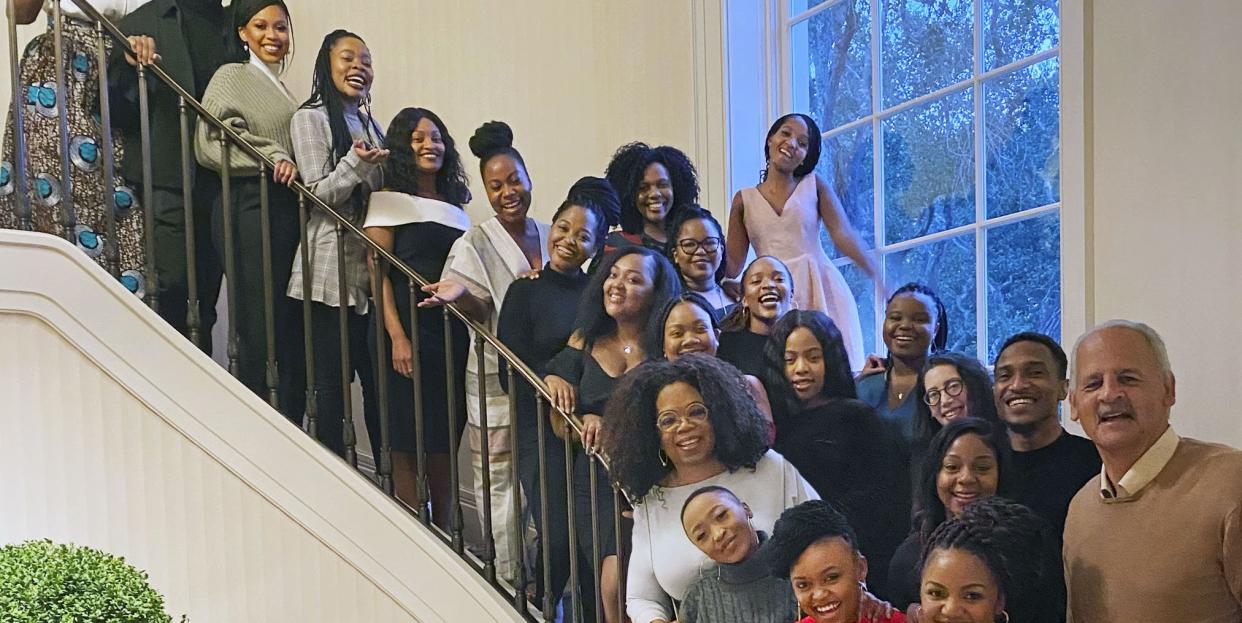How Oprah Taught Her Daughters From South Africa to Accept Love

Something wonderful always happen when my now-grown girls—graduates of the Oprah Winfrey Leadership Academy for Girls (OWLAG) in South Africa—gather around my table for Thanksgiving. We share incredible meals and even more incredible conversations. There's laughter and singing, and sometimes tears of gratitude for new revelations. There are games: charades, Balderdash, Library, Black CardRevoked. And debates: about movies, #MeToo, forgiveness, tattoos, Kanye’s church, mass incarceration. Everyone has strong opinions on every subject, and we often don’t agree. It’s the best of what family really means: a safe space to express and completely be yourself.
Recently, we were discussing worthiness—how to fully own yourself, step into the opportunities life offers, and become a whole person. We have had a lot of talks, since the girls were 12, about striving for wholeness instead of perfection. I now know that each girl gets the lesson in her own time. And since I’ve shared every story, anecdote, and piece of wisdom in my possession, I ask them to share what they’ve learned that might be helpful to one another.
Thobeka lost both her parents before she came to OWLAG. Her mother died when she was 11; her father, two years earlier. Yet she carries one of the brightest inner lights I’ve ever seen, almost literally vibrating with enthusiasm and joy. I once asked her, “How is it possible you lost both your parents, you and your siblings ended up raising each other, and you’ve turned out so happy and well?” She said, “My mother had nothing, only a third-grade education, but she gave me enough love to last a lifetime.”
I have a theory—based on my experience interviewing thousands of people—that we humans are able to achieve wholeness and well-being in direct proportion to how we receive love. Not how the love is given, but how we are able to process and accept it.
Last Thanksgiving, Thobeka shared that her mother, Rita, married at 14 and immediately became responsible for two children—her husband’s by another woman. As the years passed, Rita found herself raising children from four additional women her husband impregnated. She treated all of them just as she treated the five she birthed herself. And therefore Thobeka never saw them as half-siblings. It wasn’t until fourth grade and Thobeka’s first sex-education lesson that she realized Rita couldn’t have given birth to all 17 children she mothered.
At one point there were 15 children living in a three-room house. One room for cooking, the others for everything else. No privacy, ever. Thobeka told us that in spite of the hardship of keeping them all clothed and fed while her father was away working in the mines, her mother tucked each child in at night, going from child to child, some sleeping on the floor under the table, and asking each about their day. Though uneducated, Rita knew knowledge was a ticket to freedom and a better life.
She would show up at parent-teacher meetings concerned for how each of them was doing in school. And she continually told Thobeka that something extraordinary was going to happen to her, though she didn’t know what or how. When the opportunity to go to OWLAG came, Thobeka saw it as the extraordinary thing her late mother had prophesied.
A post shared by Oprah (@oprah) on May 12, 2019 at 1:05pm PDT
She told us: “Because I came from such an unconventional family, I learned not to expect love in a specific package but to accept it in all its forms. I believe love when it comes in.”
That’s where I halted the conversation and asked Thobeka to repeat what she’d just said. I believe love when it comes in. It’s one of the most profound revelations I’ve ever heard. Love is all around, showing up in small offerings and dramatic encounters and everyday gestures. But we can’t receive it if we’re fixated on finding it in a package called “parent” or “husband” or “lover”—whatever label fits the story you’ve told yourself.
A post shared by Oprah (@oprah) on Nov 27, 2019 at 2:33pm PST
So many of the girls at my school come from broken families. A lot feel abandoned by their fathers and are still longing for love that wasn’t given. I’ve told them again and again: Your family can only love you the way they know how. It may never be the way you want love to show up. The greatest gift we can give ourselves is to accept love in all its forms, and learn to give ourselves whatever love we didn’t receive.
Because this I know for sure: If you believe love when it comes in, healing happens. Suffering and longing subside. Sweetness unfolds and reveals a better chance at your best life.

For more ways to live your best life plus all things Oprah, sign up for our newsletter!

